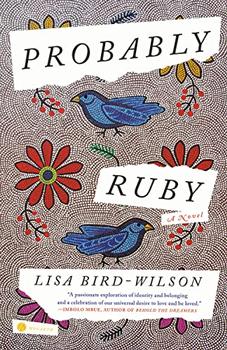Summary | Excerpt | Reading Guide | Reviews | Beyond the Book | Read-Alikes | Genres & Themes | Author Bio

A Novel
by Lisa Bird-WilsonThis article relates to Probably Ruby
In Lisa Bird-Wilson's novel Probably Ruby, a chapter set in Ruby's teenage years features references to the real-life 1991 murder of a 43-year-old Cree man, Leo LaChance, by a self-proclaimed white supremacist and member of the Ku Klux Klan named Carney Milton Nerland. LaChance was killed in a Prince Albert, Saskatchewan pawn/gun shop on the evening of January 28th. He was attempting to sell some fur pelts, and after discovering that the shop of the fur trader he usually did business with was closed, he went next door to the pawn shop, which was owned by Nerland. It's not clear what exactly transpired in the pawn shop, but investigators believe Nerland fired a gun into the floor two times and then shot Leo LaChance as he was leaving. A witness saw LaChance stumble out of the store and called the police.
Then-constable Troy Cooper was one of the first officers on the scene, and he reported that LaChance said that he had been shot by "white guys" and that he thought the gun had gone off accidentally. LaChance was taken to a hospital in Saskatoon but succumbed to his injuries in the early hours of January 29th. His assertion that the shooting was an accident, along with corroborating statements from Nerland and his friends who were in the pawnshop at the time, led to Nerland being charged with manslaughter rather than murder. During the trial, Nerland's overt racism was discounted as a motive, despite his having reportedly told a police officer, "if I am convicted of killing that Indian, they should give me a medal and you should pin it on me." He was convicted and served a little less than three years in prison.
The short investigation into the crime and Nerland's light sentence were met with frustration by the Indigenous community in Saskatchewan. An inquiry was commissioned in the aftermath of Nerland's sentencing, which concluded that racism likely played a part in the crime. The inquiry recommended that a Cree-speaking officer be on duty at all times for the Prince Albert Police Service, and that all officers be given racial sensitivity training. Speaking 20 years later, Deputy Chief Cooper remarked to Prince Albert Now, "When this occurred there was that racial tension felt every day. But we don't have that now." He went on to explain that the percentage of police on the force that are of Native descent matches the percentage of the general population. However, it is unclear from the reported details if the general Native population would agree with the assessment that Prince Albert no longer has a racism problem.
Bird-Wilson's character Ruby is preoccupied by the death of Leo LaChance after running away from home. The narrator describes Ruby's white adoptive mother being "obsessed" with the murder, explaining, "She kept talking about it, as if it was supposed to be important to Ruby because she was Native." Ruby's own response is tempered by her personal experience: "This wasn't exactly news, in terms of racism in this town....she'd grown up seeing it, in different ways, every day." Ruby struggles with the trauma of experiencing Leo LaChance's murder as an act of racial hatred, the likes of which could be projected toward her at any given time. Her white mother understands this intuitively, but seems unable or unwilling to actually help her daughter reckon with this experience in any kind of direct and proactive way.
Filed under People, Eras & Events
![]() This "beyond the book article" relates to Probably Ruby. It originally ran in April 2022 and has been updated for the
January 2023 paperback edition.
Go to magazine.
This "beyond the book article" relates to Probably Ruby. It originally ran in April 2022 and has been updated for the
January 2023 paperback edition.
Go to magazine.
Your guide toexceptional books
BookBrowse seeks out and recommends the best in contemporary fiction and nonfiction—books that not only engage and entertain but also deepen our understanding of ourselves and the world around us.